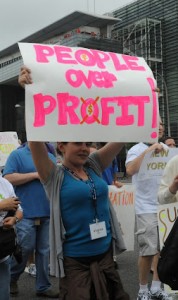For Immediate Release: June 28, 2012
Contact:
- Kelly Buckland, Executive Director of the National Council on Independent Living (NCIL) in Washington, D.C.: 202-207-0334
- Dan Kessler, NCIL Board President and Executive Director of Disability Rights and Resources in Birmingham, AL: 205-251-2223
- Lou Ann Kibbee, NCIL Vice President and IL Program Manager of SKIL Resource Center in Hays, KS: 785-623-8069
- Susan Dooha, Executive Director of the Center for the Independence of the Disabled, New York in NYC, NY: 646-442-4163
Washington, DC – The National Council on Independent Living (NCIL) – a membership organization that advances independent living and the rights of people with disabilities through consumer-driven advocacy – hails the U.S. Supreme Court’s ruling on the Affordable Care Act (ACA) as a validation of the Act’s opportunities for people with disabilities. Since President Obama signed the Affordable Care Act into law, millions of people with disabilities have benefited by being able to access coverage that could have previously been denied, expand coverage that was previously limited, and pursue more options to receive services in their own homes rather than nursing homes and institutions.
“In short, for people with disabilities, the Court’s decision is historic,” said Kelly Buckland, NCIL’s Executive Director. “This decision means that people with disabilities will have new community living options to live in their own homes and will be able to access essential health care coverage regardless of pre-existing conditions.”
NCIL has focused on ACA opportunities that move the country closer to a more integrated society where all people are afforded the opportunity to lead an independent life. These provisions include the Community First Choice Option, the Balancing Incentives Program, and Money Follows the Person, all of which further opportunities for people with disabilities to live integrated in communities across America.
“We are thrilled that the Supreme Court upheld the Affordable Care Act,” said Dan Kessler, NCIL’s Board President and Executive Director of Disability Rights and Resources in Birmingham, AL. “Because of the ACA, no longer will states have excuses to rely on nursing facilities and other institutions that warehouse people who do not need or want to live there. This is one of the great civil rights fights of our time: to ultimately see all people with disabilities live integrated in the community, not locked away in segregated settings.”
What the Law Does for People with Disabilities: Because of the ACA, more than 17 million children with pre-existing conditions will no longer be at risk of being denied coverage. In 2014, that protection will extend to anyone of any age with a pre-existing condition. The law protects people with disabilities from dollar limits on health benefits, ensuring that people with disabilities will continue to receive the coverage they need. The law improves physical access to medical equipment and services, ensuring that inaccessibility won’t get in the way of an individual’s health care needs.
“This feels like moving a mountain,” said Andy Curry, NCIL Healthcare Subcommittee Chair and Executive Director of the Tri-County Independent Living Center in Ogden, UT. “We believe that people with disabilities have the same constitutional protections as any other person to enjoy the right to a fully integrated life and the ACA has been a major boost to advancing this right.”
In addition, the law furthers the promise of the 1999 U.S. Supreme Court’s Olmstead decision, which gives people with disabilities the right to receive long term services and supports in the most integrated setting in accordance with the Americans with Disabilities Act. The law extends and enhances the Federal Money Follows the Person program, which in the past five years has helped 20,000 people move out of institutions and into less costly, more independent, community-based settings. The law also creates the Community First Choice Option, which offers the incentive of a six percent increase in Federal Medicaid matching rate for states that provide community services as an alternative to institutional services for people with disabilities enrolled in Medicaid.
The decision does eliminate the federal government’s authority to penalize states for choosing not to expand Medicaid, making the Medicaid expansion – like the provisions eliminating the institutional bias – optional. This could have serious consequences for people in states that choose not to expand Medicaid under the Affordable Care Act. “We now have the tools to provide health care and eliminate the institutional bias, but it’s up to states to make that happen. In a time when states face serious fiscal concerns, they may be reluctant to initiate or continue this expansion, so state-level advocacy is now more important than ever,” said Susan Dooha, Executive Director of the Center for Independence of the Disabled, NY. NCIL calls upon disability, aging, religious, labor and civil rights groups to work together to advocate that states take advantage of these new opportunities and develop state-level My Medicaid Matters campaigns because MY MEDICAID MATTERS.
As a membership organization, the National Council on Independent Living (NCIL) advances independent living and the rights of people with disabilities through consumer-driven advocacy. NCIL envisions a world in which people with disabilities are valued equally and participate fully. For more information, visit: www.ncil.org.

